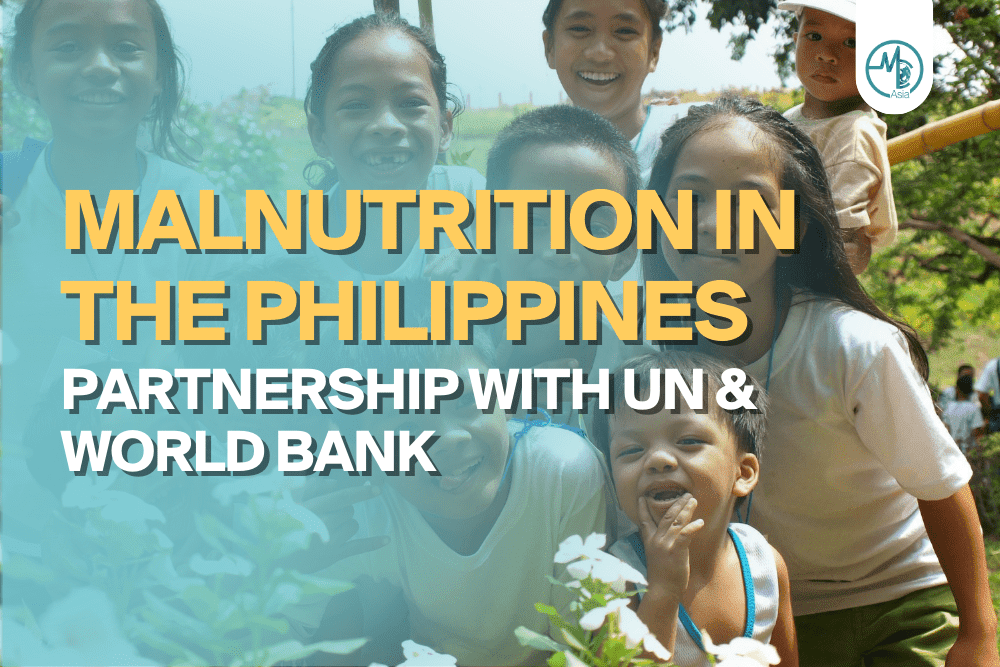In a significant stride towards addressing malnutrition in the Philippines, the Department of Health (DOH) partnered with United Nations (UN) agencies, including UNICEF and the United Nations Office for Project Services (UNOPS), as well as the World Bank.
This collaborative effort marks the start of a strategic partnership in combating malnutrition nationwide.
The Philippine Multisectoral Nutrition Project (PMNP)
At the core of this partnership lies the Philippine Multisectoral Nutrition Project (PMNP), a four-year initiative led by the DOH in collaboration with the Department of Social Welfare and Development (DSWD). The PMNP adopts a multisectoral approach to implement nutrition-specific and nutrition-sensitive interventions across 235 local government units (LGUs) in the Philippines. Additionally, 40 municipalities in the Bangsamoro Autonomous Region of Muslim Mindanao (BARMM) are included in this project.
The primary objective of the PMNP is to enhance the utilisation of a comprehensive package of nutrition-specific and nutrition-sensitive interventions, focusing on reducing stunting rates. The initiative also aims to improve critical behaviours and practices that contribute to better nutritional outcomes. Moreover, it seeks to build the capacity of the DOH. It also seeks support the delivery of nutrition and health care services at the primary care and community levels. This is especially focused in areas with high incidences of poverty and malnutrition.
A Holistic Approach to Nutrition
The significance of this collaboration extends beyond the health sector, acknowledging the interconnection of nutrition with societal and economic goals. Ndiame Diop is the World Bank Country Director for Brunei, Malaysia, Philippines, and Thailand. He emphasised the importance of improving the nutritional status of children as crucial for achieving national goals related to human capital, economic recovery, and long-term growth.
Strengthening Service Delivery
The partnerships with UNICEF and UNOPS aim to enhance primary health care and nutrition service delivery. This includes providing healthcare equipment and supplies, basic primary care and nutrition commodities, and the development of multisectoral information systems for localised decision-making. Capacity building for frontline healthcare workers, community health navigation, and leadership and governance for local chief executives are also integral components of the collaboration.
Social Behaviour Change and Communication (SBCC)
This partner recognises the importance of communication in promoting positive health behaviours. It will focus on social behaviour change and communication (SBCC). This involves efforts to raise awareness, change attitudes, and encourage practices that support improved nutrition. Additionally, the collaboration will involve verifying LGU performance and finance systems for performance-based grants, as well as project measurement and evaluation.
UNICEF’s Commitment to Child Nutrition
UNICEF Philippines Representative Oyunsaikhan Dendevnorov emphasised the fundamental right of children to good nutrition. UNICEF is dedicated to supporting efforts to end child stunting. They ensure that every child has the opportunity to grow and develop to their full potential, which aligns with the broader global efforts to achieve Sustainable Development Goals (SDGs).
Community-Driven Development
The collaboration is also aligned with the community-driven development approach of DSWD Kapit-bisig Laban sa Kahirapan Comprehensive and Integrated Delivery of Social Services (KALAHI-CIDSS). This approach empowers local communities to take an active role in improving access to clean water, proper sanitation, enhanced hygiene practices (WASH), and Early Childhood Care and Development (ECCD) services. Presently, implementing communities have successfully initiated over 3,000 procurement packages through the community-based procurement system.
Breaking Cycles of Poverty and Hunger
Oscar Marenco, UNOPS Philippines Country Manager, highlighted the potential of improved nutrition for children. When children have better nutrition, they learn better, creating opportunities to gradually break the cycles of poverty and hunger. Through the Philippine Multisectoral Nutrition Project, UNOPS and its partners aim to reach those furthest behind and contribute to achieving the SDGs.
Expanding Knowledge and Expertise
The partnership between the DOH and the UN is not only about resource mobilisation but also about knowledge exchange. By collaborating with UN agencies, the DOH gains access to global expertise and resources, expanding its knowledge base and network. Leveraging the UN’s global portfolio of programs and initiatives, the DOH can enhance and optimise its public health programs and services.
A Shared Commitment to a Healthier Future
DOH Secretary Teodoro Herbosa emphasised that the PMNP recognises that nutrition is not just a matter of health. It is also a foundation for social and economic development. The collaboration between the DOH and the UN is a testament to their shared commitment to building a healthier and better future for the Filipino people, particularly women and children.
Conclusion
The partnerships between the DOH, UNICEF, UNOPS, and the World Bank mark a significant step towards addressing malnutrition in the Philippines. The PMNP promises to create a healthier and more prosperous future for the Filipino people. Through collaboration and shared commitment, the partners aim to break the cycles of poverty and malnutrition. Consequently, fostering long-term growth and development.

